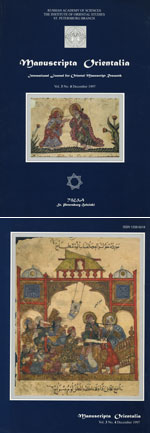|
|
| |

|

|
Polosin V. Two Late Eighteenth-Century Ottoman Fiscal Documents from the Manuscript Collection of the St. Petersburg Branch of the Institute of Oriental Studies // Manuscripta Orientalia. Vol. 3, No 4, December 1997. P. 30-34.
In the Ottoman empire, as earlier under the caliphate, non-Muslim subjects were obligated to pay a poll-tax — jizya, excluding children, women, invalids, the blind, and the non-working poor. Since the tax was at various times collected in various ways, it is sometimes difficult to term it a poll-tax. In villages, until a new register of tax-payers was drawn up, peasants had to pay the tax for those who had died or for neighbors who had fled. For a long time, the household and its occupants was considered the basic unit of taxation. After a tax reform in 1691, the tax became strictly individual. Upon payment of the tax, each tax-payer received a receipt called waraq or kagid, which simply means “paper”. Payments were recorded in special registers — daftars. These were drawn up duplicate: one copy was sent to the capital, the second remained in the provincial archive. The daftars were collected in a special department in Istanbul called the qalam-i jizya. This department prepared the payment receipts every year and, when the time came, handed them over to tax-collectors in sealed bags. Every year the Ottoman Sultan determined tax rates on the basis of a fatwâ handed down by the shaykh al-islâm. There were three tax rates: high, middle, and low.
A large number of daftars is preserved in archives: 418 volumes of financial registers for the poll-tax for the period from 1551 to 1840, and 36 volumes of the Christian affairs register for the period from 1641 to 1838...
 PDF-files PDF-files
The entire paper
Keywords
daftar
financial documents
Manuscripta Orientalia, selected papers
the Ottoman empire
|
|
|
|
Random news: Announcements |
|
On March 6–7, 2025, the Institute of Oriental Manuscripts RAS, the Saint Petersburg State University (Faculty of Asian and African Studies) and the Confucius Institute (at the Saint Petersburg State University) will jointly hold the 10th All-Russian Conference of Young Orientalists “China and Its Neighbours”. |
|
Read more...
|
|
|
|
|

